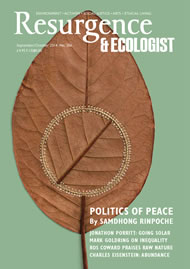Once considered the main alternative to Western capitalism, modern China is on a parallel and dizzying course of economic growth. Despite the accumulating cost to humans and Nature, high-level calls for ‘many-sided’ (balanced) development, and recent vows to control toxic air pollution, the parameters of progress are rarely, it seems, questioned in depth. The rush from rural ‘backwater’ to ‘advanced’ city life seems axiomatic.
One Guizhou resident put it thus in this book: “When we were small, our life was deeply merged with the village. At school age, we left the village. We studied hard but the knowledge had nothing to do with the village. Those who didn’t go to school left their home and worked outside. In any case, our aim was leaving the village for the city.”
This collection of stories and anecdotes paints a more varied picture. A recurring theme is regret at the decline of the local environment: the rising tide of plastic rubbish; the loss of beloved catfish in local streams, due to pollution and the breakdown of traditional fishing restraints. Culture is eroded with Nature; in a Tibetan village, a destructive landslip caused by deforestation reminds villagers of their neglected reverence for the Mountain God. Returning Guangxi students listen to their aunts’ traditional songs, and are shamefully unable to reciprocate. Through them we feel the loss of sisterhood, “thick in rural villages, but thin in cities”.
Revival and Resilience stems from the work of a unique organisation, Partnerships for Community Development (PCD). Founded in 2001 with the support of the Kadoorie Foundation, it inherited the Foundation’s commitment to a dignified life as the entitlement of all. Like its sister charity Kadoorie Farm and Botanic Garden, PCD believes this life should be rooted in relationships, including a clear-eyed view of energy and resources. The rural-to-urban diaspora has been, like economic growth itself, a by-product of the cheap fossil-fuel era. Like most aspects of ‘progress’ it is double-edged – and reversible.
Ecological agriculture – low-carbon, low-tech, low-chemical – runs through much of PCD’s work. But rather than bringing quick fixes to the ‘hardware’, PCD’s emphasis is on the ‘software’. It works with communities to reconnect people with Nature, from the heart, and to explore ways to live sustainably: simply, in harmony with Nature, and in locally self-reliant communities. PCD holds that contentment, creativity and security come not from extrinsic factors like money and status, but from expansive and mutually supportive relations. The shared vision of community is “small but rich in substance” – finding tradition and ecology have more to offer than the globalised marketplace.
Unlocking this potential calls for a skilled pool of facilitators, many of whom contribute to this anthology. Referring to the Community Stories writing project she facilitates, Miao Yun notes how the writing process encourages people “to slow down a little, to let personal feelings come out, and to give deeper thought to the stories that they have encountered”. She likens formalised reports to putting on formal dress – there is a distancing between the writer, the community and the reader. Personal stories strip off the dressing, and help us bridge the gap.
Through this approach, we feel the impacts of projects: how reflecting on litter brought about the motivation to clean it up; how a group of young Miao people retraced their ancestors’ migration route, bringing the songs and stories to unforgettable life; how setting infrared cameras in the forests evoked a deeper appreciation of wildlife.
Not every project has worked practically, and the sharing of disappointments is a valuable element. “The ideas were good but the will and strength did not match,” wrote one participant. Indeed many of those who have challenged the mainstream ideas have met ongoing bafflement, or resistance, from elders still caught up in Green Revolution thinking. “What happened to the university students like you? What has gone wrong?” was one such response. “Don’t fool around any more!” Some have bowed to such pressure, and reverted, for now at least, to occupations within the ‘system’.
But undeniably, and even to China’s leaders, such work brings a welcome touch of yin to the relentless yang of ‘modernisation’. An earlier PCD book, The Dialogue, recorded discussions between 10 young interns and their mentors in a community-based programme. Each spoke, over three years, of their aspirations for their people, their land and the issues they are involved with. The book was selected by the government as recommended reading for elementary schools and high-school students in China. There is no challenging dogma here: only a searching for inner truth in confusing times.
If China’s development is a river in full flow, the perspectives gathered here are like snagged twigs in the current, arrayed at differing angles. While distinctly Chinese in flavour, the sum effect is a universal reflection around community; for those seeking a more human path, respectful of natural limits and resonant with natural rhythms, the tales may bring welcome solidarity and hope.
They also challenge the inevitability of that progression from rural to urban. As a Miao-minority student says, “We don’t need to promote Miao culture. What is needed is for young people to return home and inherit it.” Another contributor concludes, of another backwater: “Falling behind the steps of modernisation may be a blessing to the community after all.”
Revival and Resilience: Community Stories in China is available from PCD www.pcd.org.hk







